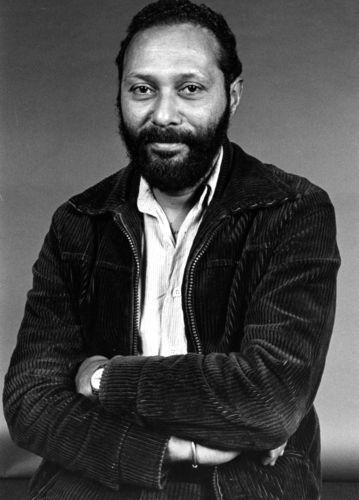Stuart Henry McPhail Hall
Stuart Hall was a Jamaican-British academic, writer and cultural studies pioneer. Stuart Hall was a Rhodes scholar at Merton College, Oxford, Director of the Birmingham Centre for Contemporary Cultural Studies and Professor of Sociology at the Open University. He presented a number of television programmes including the BBC series Redemption Songs and many broadcasts for the Open University.
He was the President of the British Sociological Association and a member of the Runnymede Commission on the Future of Multi-Ethnic Britain. He also chaired the arts organisations Iniva and Autograph ABP.
Stuart Hall was the first editor of New Left Review, a founding editor of the journal Soundings and author of many articles and books on politics and culture, including Policing the Crisis and The Great Moving Right Show (for Marxism Today), in which he famously coined the term ‘Thatcherism’.
A memoir by Stuart Hall Familiar Stranger: A Life between Two Islands (Allen Lane/ Duke University Press and Penguin), and a collection of Stuart Hall’s political essays Selected Political Writings: The Great Moving Right Show and other essays (Lawrence and Wishart) were published in 2017.
3 February 1932
10 February 2014 (aged 82)
London, England
Hall’s health, always more precarious than he let on, declined; he had to face intensive dialysis and later, at an advanced age, a kidney transplant.
How died if relevant: Kidney failure
Burial / cremation/ memorial and location site if known: Highgate Cemetery (east side) in north London, England
Kingston, Jamaica
Moved the UK if applicable: 1951
Jamaican family of African, English, Portuguese Jewish, and likely Indian descent.
1951 – moves to England after winning a scholarship to Oxford University
1957 – he joined the Campaign for Nuclear Disarmament (CND) and it was on a CND march that he met his future wife Catherine Barrett
1958 to 1960 – Hall worked as a teacher in a London secondary modern school and in adult education.
1964 – married Catherine
1964 – Hall’s academic career took off after he co-wrote with Paddy Whannel of the British Film Institute one of the first books to make the case for the serious study of film as entertainment, The Popular Arts
1968 – Becomes Director of the Centre for Contemporary Cultural Studies at the University of Birmingham
1979 – Hall and Maggie Steed presented It Ain’t Half Racist Mum, an Open Door programme made by the Campaign Against Racism in the Media (CARM) which tackled racial stereotypes and contemporary British attitudes to immigration
1980 – Hall presented his 1974 paper on encoding and decoding model in Encoding/Decoding in Culture, Media, Language.
1980s – appointment as a Professor of Sociology at the Open University (OU) that year.
1995 – he was a founding editor of Soundings: A Journal of Politics and Culture
1996 – his essay Cultural Identity and Diaspora presents two different definitions of cultural identity.
1997 – Hall retired from the Open University
2005 – elected fellow of the British Academy
2008 – received the European Cultural Foundation’s Princess Margaret Award
2014 – died away following kidney failure
2017 – His memoirFamiliar Stranger: A Life Between Two Islands (co-authored with Bill Schwarz), was posthumously published.
He was born in Kingston, into an aspiring Jamaican family. His father, Herman, was the first non-white person to hold a senior position as chief accountant with United Fruit in Jamaica. Jessie, his formidable mother, had white forebears and identified with the ethos of an imaginary, distant Britain. Hall received a classical English education at Jamaica College in Kingston, while allying himself with the struggle for independence from colonial rule. He attended Jamaica College, receiving an education modelled after the British school system
In 1951 Hall won a Rhodes Scholarship to Merton College at the University of Oxford, where he studied English and obtained a Master of Arts degree, becoming part of the Windrush generation, the first largescale emigration of West Indians, as that community was then known. He originally intended to do graduate work on the medieval poem Piers Plowman, reading it through the lens of contemporary literary criticism, but was dissuaded by his language professor, J RTolkien, who told him “in a pained tone that this was not the point of the exercise.” He began a PhD on the novelist Henry James but, galvanised particularly by the 1956 Soviet invasion of Hungary and the Suez Crisis, he abandoned this to focus on his political work. In 1957, he joined the Campaign for Nuclear Disarmament (CND) and it was on a CND march that he met his future wife Catherine Barrett. From 1958 to 1960, Hall worked as a teacher in a London secondary modern school and in adult education, and in 1964 married Catherine, concluding around this time that he was unlikely to return permanently to the Caribbean.
After working on the Universities and Left Review during his time at Oxford, Hall joined E P Thompson, Raymond Williams and others to merge it with The New Reasoner, launching the New Left Review in 1960 with Hall as the founding editor. In 1958, the same group, with Raphael Samuel, launched the Partisan Coffee House in Soho as a meeting place for leftwingers. Hall left the board of the New Left Review in 1961 or 1962.
Hall’s academic career took off in 1964 after he co-wrote with Paddy Whannel of the British Film Institute `one of the first books to make the case for the serious study of film as entertainment’, The Popular Arts. As a direct result, Richard Hoggart invited Hall to join the Centre for Contemporary Cultural Studies at the University of Birmingham, initially as a research fellow at Hoggart’s own expense. In 1968 Hall became director of the centre. He wrote a number of influential articles in the years that followed, including Situating Marx: Evaluations and Departures (1972) and Encoding and Decoding in the Television Discourse (1973). He also contributed to the book Policing the Crisis (1978) and coedited the influential Resistance Through Rituals (1975).
Shortly before Thatcher became Prime Minister in 1979, Hall and Maggie Steed presented It Ain’t Half Racist Mum, an Open Door programme made by the Campaign Against Racism in the Media (CARM) which tackled racial stereotypes and contemporary British attitudes to immigration. After his appointment as a professor of sociology at the Open University (OU) that year, Hall published further influential books, including The Hard Road to Renewal (1988), Formations of Modernity (1992), Questions of Cultural Identity (1996) and Cultural Representations and Signifying Practices (1997). Through the 1970s and 1980s, Hall was closely associated with the journal Marxism Today; in 1995, he was a founding editor of Soundings: A Journal of Politics and Culture.
He spoke internationally on Cultural Studies, including a series of lectures in 1983 at the University of Illinois at Urbana-Champaign that were recorded and would decades later form the basis of the 2016 book Cultural Studies 1983: A Theoretical History (edited by Jennifer Slack and Lawrence Grossberg).
Hall was the founding chair of Iniva (Institute of International Visual Arts) and the photography organization Autograph ABP (the Association of Black Photographers).
Hall retired from the Open University in 1997. He was elected fellow of the British Academy in 2005 and received the European Cultural Foundation‘s Princess Margriet Award in 2008. He died on 10 February 2014, from complications following kidney failure, a week after his 82nd birthday. By the time of his death, he was widely known as the “godfather of multiculturalism”. His memoir, Familiar Stranger: A Life Between Two Islands (co-authored with Bill Schwarz), was posthumously published in 2017.
Ideas – a summary of his influential thinking
Legacy
- The Stuart Hall Library, Iniva‘s reference library at Rivington Place in Shoreditch, London, founded in 2007, is named after Stuart Hall, who was the chair of the board of Iniva for many years.
- In November 2014, a weeklong celebration of Stuart Hall’s achievements was held at the University of London‘s Goldsmiths College, where on 28 November the new Academic Building was renamed in his honour, as the Professor Stuart Hall building (PSH).
- The establishment of the Stuart Hall Foundation in his memory and to continue his life’s work was announced in December 2014. The Foundation is `committed to public education, addressing urgent questions of race and inequality in culture and society through talks and events, and building a growing network of Stuart Hall Foundation scholars and artists in residence.’
- In May 2016, Housmans bookshop sold Hall’s private library. 3,000 books were donated to Housmans by Hall’s widow Catherine Hall.
Film
Hall was a presenter of a seven-part television series entitled Redemption Song — made by Barraclough Carey Productions, and transmitted on BBC2, between 30 June and 12 August 1991 — in which he examined the elements that make up the Caribbean, looking at the turbulent history of the islands and interviewing people who live there today. The series episodes were as follows:
- Shades of Freedom (11/08/1991)
- Following Fidel (04/08/1991)
- Worlds Apart (28 July 1991)
- La Grande Illusion (21 July 1991)
- Paradise Lost (14 July 1991)
- Out of Africa (7 July 1991)
- Iron in the Soul (30 June 1991)
Hall’s lectures have been turned into several videos distributed by the Media Education Foundation:
- Race, the Floating Signifier (1997).
- Representation & the Media (1997).
- The Origins of Cultural Studies (2006).
Mike Dibb produced a film based on a long interview between journalist Maya Jaggi and Stuart Hall called Personally Speaking (2009).
Hall is the subject of two films directed by John Akomfrah, entitled The Unfinished Conversation (2012) and The Stuart Hall Project (2013). The first film is on show at Tate Britain, Millbank, London until April 2023 while the second is now available on DVD.
In August 2012, Professor Sut Jhally conducted an interview with Hall that touched on a number of themes and issues in cultural studies.
Book
- McRobbie, Angela (2016). Stuart Hall, Cultural Studies and the Rise of Black and Asian British Art. McRobbie has also written an article in tribute to Hall: “Times with Stuart”. OpenDemocracy. 14 February 2014. Retrieved 30 June 2014.
Scott, David (2017). Stuart Hall’s Voice: Intimations of an Ethics of Receptive Generosity. Duke University Press.
On the 1963 Campaign for Nuclear Disarmament march from Aldermaston to London, Hall met Catherine Barrett, and they married the following year. With his appointment to the CCCS they moved to Birmingham where their two children, Becky and Jess, were born, and where they lived until 1979. During these years Catherine became an acclaimed historian, and the marriage proved to be a source of great mutual love and support. Their homes, in Birmingham and then in London, were welcoming places, drawing in their many friends.
After his death, Stuart Hall was described as `one of the most influential intellectuals of the last sixty years.
Links to wider Resources:
Credits (where info sourced from)
Stuart Hall obituary | Sociology | The Guardian




